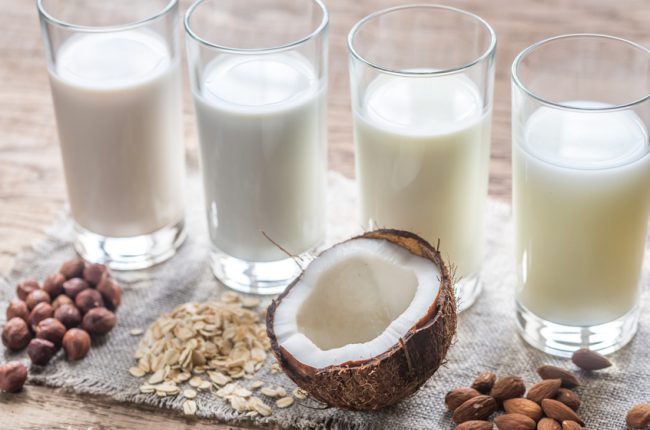When it comes to healthy beverages, what’s your best bet? Many people fill their glasses with juice, tea, coffee, smoothies, lemonade (and hopefully water!) to quench their thirst. But what about milk–or one of its many non-dairy competitors? Over the last several years, the dairy-free milk industry has been booming. The options are seemingly endless, from classic soy to coconut, hemp and even cashew or pistachio! Besides varying by taste and texture, each of these drinks offers different benefits in terms of nutrition.
Whether you’re following a dairy-free diet or just looking for something new and refreshing to sip, here are some of the top plant-based milks you can try:
Hyped on hemp
Derived from the cannabis plant and perfectly legal to enjoy, hemp offers omega-3 fatty acids which may help support heart and brain health. Hemp milk is a great option for those suffering from soy or tree nut food allergies but also avoiding dairy due whether by choice, due to a milk allergy or due to lactose intolerance.
Fierce flax
Similar to hemp, flax also contains omega-3 fatty acids, this time in a slightly more concentrated sense, delivering about 1,200 mg ALA (alpha-linolenic acid) omega-3 fatty acids per cup. Keep in mind that making the transition from dairy-based to plant-based milks for health purposes could actually increase the amount of added sugar! Be smart and look for either unsweetened non-dairy milks or those with less than 5 grams of sugar per serving.
Get it right with grains
Oat and rice milks are also popular non-dairy milk alternatives. Some people report that these milks are gentler on irritable stomachs. As with many non-dairy milks, most grain-based milks have added vitamin B12, which is inherent only to animal-based products, as well as calcium, tohelp mimic some of the nutrition present in dairy milks.
Likeable legumes
Soy is normally a powerhouse food (think: edamame, tofu, soy-based meat analogs or tempeh)–and soy milk is no exception. Soy contains all the nine essential amino acids needed to make usable proteins in our bodies, which is unique in the plant kingdom. If comparing soy milk side-by-side to dairy milk, soy milk delivers 7 grams of protein and dairy milk offers 8 grams of protein per serving. The use of soy has great support from nutrition professionals and can be an appropriate food for all individuals, including children, men, pregnant or lactating women, menopausal women and those with chronic illness.
A quest for quinoa
Quinoa (pronounced: “keen-wah”) is also an impressive source of complete protein in a plant-based or omnivorous diet. An interesting part of the manufacture of plant milks, including quinoa milk, often includes the addition of thickeners, such as carrageenan or guar gum, to imitate the consistency or mouth feel of dairy milk. These thickeners are “GRAS” (Generally Recognized as Safe) per the FDA (Food & Drug Administration).
The capable coconut
Coconut gets an A+ on versatility. The tropical taste of coconut (did you know coconut is a tree nut?) alone is an exciting and refreshing flavor that adds dimension to food and drinks. At the grocery store you’ll likely find packaged coconut powder, flakes, chips, water, oil, sugar and of course coconuts themselves. It’s important to note that coconut has an undesirable fat content, with 10 grams of saturated fat per eight fluid ounce serving. Some research supports that the predominant type of saturated fat in coconut, the medium-chain triglyceride (MCT) “lauric acid,” may not be as detrimental to heart health as other types found in butter.
Nuts about nut milks
Most nut milks, including cashew, almond, pistachio, walnut, and hazelnut, have wide acceptability when it comes to taste. You may also find these milks to be most abundant at the supermarket. Oftentimes, these milks come in additional varieties such as unsweetened, original, vanilla, chocolate, light, or with added protein.
Shop dairy-free favorites, from creamy milk alternatives to chocolate-rich candy!

